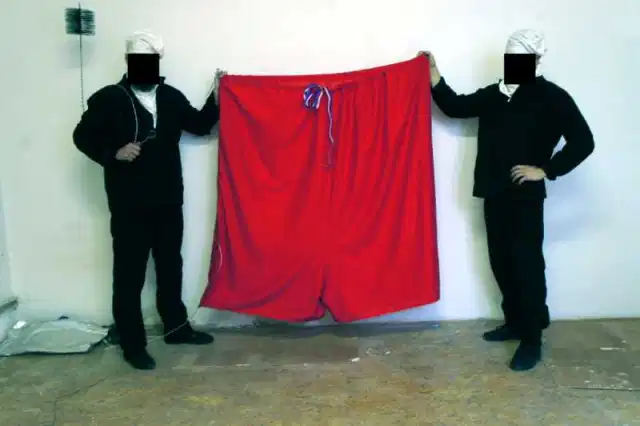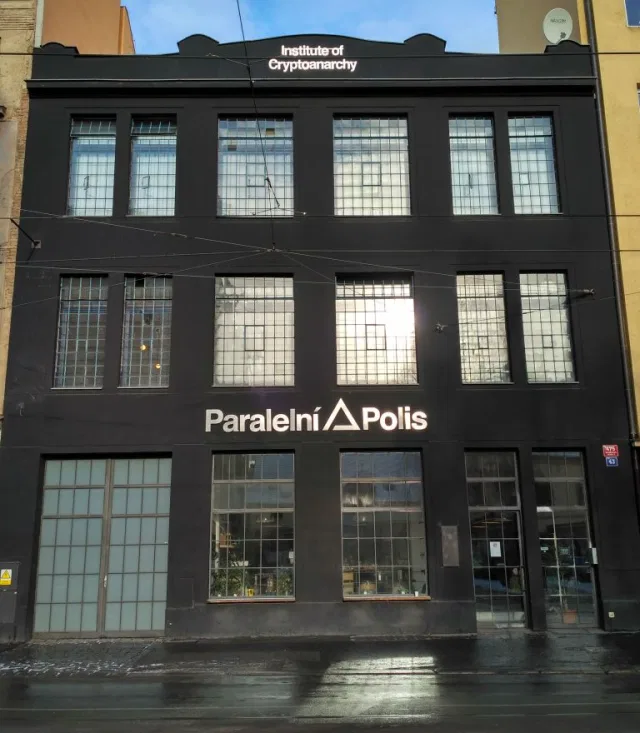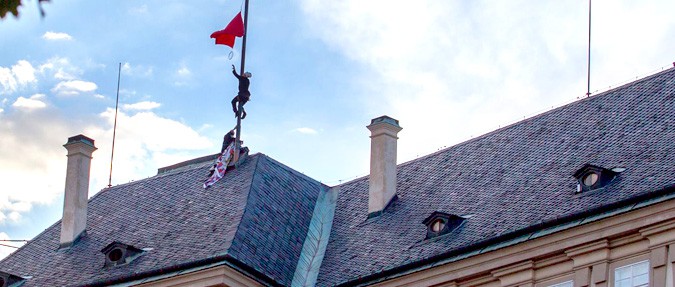Pavol Lupták isn’t a fan of authority. When he was part of a Czech art collective called Ztohoven, he replaced the proud flag flying above Prague Castle with a giant pair of red underpants. Later, he helped hack into weather cams being broadcast live on breakfast TV to show footage of a fake atomic explosion. Ztohoven also used a SMS spoofing technique to send messages between over 500 members of parliament, including the President and Prime Minister of the Czech Republic, causing widespread confusion among the political class. One text read, scoldingly: “We must not lie to people, cheat the country.”
But Lupták’s exploits with Ztohoven were just a prelude for his most ambitious project: Paralelní Polis, a multi-purpose crypto-anarchy workspace, think tank and activist shop in the cool Holešovice district. Housing the Institute of Cryptoanarchy, the Bitcoin Coffee café, a 3D printing workshop, and a co-working space called Paper Hub, Paralelní Polis serves as a hub for alternative ideas based on crypto, and pushes for a parallel financial ecosystem that fundamentally rejects government interference and control. And the Prague location is just the start: The group is planning further buildings in other major cities.
“The government is losing control of the virtual world, thanks in part to crypto technologies,” says Lupták. “They are also losing their monopoly over issuing money due to cryptocurrencies and soon companies will move to using smart contracts on the blockchain. This is happening now.”
Members of Ztohoven

Prague may only be home to 1.3 million people (including plenty of American expats and English stag-goers), but it can stake a claim to be crypto hotspot. Forbes reckons the City of a Hundred Spires has the largest number of bitcoin-accepting businesses per capita. Several blockchain startups call Prague home including General Bytes, the largest provider of bitcoin ATMs in the world, and SatoshiLabs, inventor of Trezor, the world’s first bitcoin hardware wallet.
The Czech capital has built a reputation as a center of anarchic thought, creating the ideal environment for a venture like Paralelní Polis to get off the ground. “We are building an alternative to the existing Czech government,” says Lupták. “Crypto technology is a tool we can use for liberation and achieving our main goal—freedom.”
Paralelní Polis emerges from a culture that spawned anti-Soviet dissidents, like Vaclav Benda, and his anti-communist dissident organization Charter 77, and the playwright Vaclav Havel, who ironically ended up becoming president of the Republic, despite his own anti-establishment leanings.
“Benda realized it was not possible to change the system or start a revolution but what we can do is build a parallel society and culture, with the only free society being one that respects the existence of the parallel one,” says Lupták.
New branches of Paralelní Polis are set to appear across the globe over the next few months and years, with a fully functioning Paralelná Polis opening in Slovakia late last year, another opening in Barcelona in the near future, alongside ongoing conversations around launching a further location in the Bosnian capital of Sarajevo, the group says.
Institute of Cryptoanarchy
The Institute of Cryptoanarchy, housed on the top floor of Paralelní Polis, wants to educate people who don’t yet know about crypto technologies,explains Radim Kozub, board member at Paralelní Polis responsible for the Institute of Cryptoanarchy and cofounder of cryptocurrency law firm, Blockchain Legal. It also wants to maintain the purity of the anarcho-crypto movement fending off Wall Street types who don’t share those values.

The group’s annual Hackers Congress is the largest of its kind in Europe and sees developers and activists from around the world descend on Prague Paralelní Polis. The tickets for the most recent event sold out in just a few days. Speakers include Vít Jedlička, president of the Liberland micronation, Amir Taaki, and Jim Bell, author of Assassination Market Politics, who gave a 2017 talk about how to sponsor anonymous assassinations of politicians and government officials.
A lot has changed since Lupták started Paralelní Polis over five years ago, not least the public’s understanding of cryptocurrencies. “We had a lot of problems when someone came in off the street because they had no idea how to use cryptocurrencies or bitcoin. We were desperate, nobody understood - now everybody who comes here knows everything,” says Lupták.
Lupták and the team at Paralelní Polis are not sure of what the future holds for this genuinely singular space but they remain optimistic. “We have a tutorial on how to create your own Paralelní Polis on our website, so anybody can make it anywhere they want. There is no central organization. It’s not possible to ban the ideas,” he adds.

Cryptoanarchy has a long, fascinating history, going back to Timothy C May’s 1988 “Crypto Anarchist Manifesto,” prepper and libertarian enclaves, and the darker side of Silicon Valley. Paralelní Polis is a physical space to champion the value of his virtual space of ideas, sop everyday people can interact with such revolutionary ideas.
Czech regulators have taken a relatively neutral stance on crypto businesses. But Luptak and his collaborators worry about plans for a draconian “electronic evidence of sales” law could that requires all transactions in the country, including cash, to be digitized and sent to the tax authorities. Placing the government once again at the heart of financial transactions eradicates the notion of financial freedom at the heart of the bitcoin (and successive crypto projects).
“Paralelná Polis is the only organization in the Czech Republic that is openly boycotting this financial system—it’s complete financial surveillance—you have to be connected to the system or the government will give you a huge fine. We are still waiting for a raid from police,” Luptak says.
Then again he doesn’t seem too worried. Cryptoanarchy is bigger than the Czech Republic. “They can close Paralelní Polis in Prague, but it’s already gone worldwide,” says Luptak.
